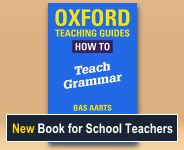Verbs: Modal verbs
Modal auxiliary verbs (or modals for short), as the name suggests, are a kind of auxiliary verb. They have most of the attributes of auxiliary verbs. They are a closed class that is identifiable as a short list, and they convey particular types of meaning.
Here is a table which lists the most important modal verbs (also called the core modals). It shows most of them in pairs as present and past tense forms, which makes them easier to remember.
Welcome back!

Englicious is totally free for everyone to use!
But you will have to log in to see our library of teaching resources.
If you don’t have an account, that’s perfectly OK. You can register (for free).
It only takes a minute or two.
»
- Printer-friendly version
- Log in to view or leave comments

